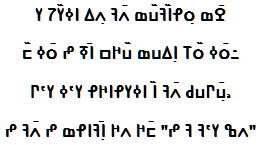Bambara love poem
ߘߎ߬ߓߊ߬ߟߋ߲
ߌ ߖߌ߬ߦߊ ߡߍ߲ ߓߍ߫ ߘߎ߬ߓߊ߬ߟߋ߲ ߘߐ߫
ߏ߬ ߦߋ߫ ߒ ߧߊ߫ ߛߞߎ߬ ߘߎߡߊ߲ ߠߋ߬ ߦߋ߫߸
ߣߴߌ ߦߴߌ ߟߞߊߟߌߦߊ ߊ߬ ߓߍ߫ ߕߎߣߎ߲߫،
ߒ ߓߍ߫ ߒ ߘߟߊߓߊ߲߫ ߞߍ ߞߏ߫ "ߒ ߓ ߓߴߌ ߝߍ"

Romanization
Dùbàlén
í jìyá` mɛ́n` bɛ́ dùbàlén` dɔ́
ò yé Ń ɲá sùkù dúmán` nè yé,
n'í y'í lákálíyá` à bɛ́ túnún,
Ń bɛ́ Ń dálábán kɛ́` kó "Ń b b'í fɛ"
Another version
Y dia dounkarela
Oyé ne ka fin gnomagné
Ybi teliya abe tounou
Nka fin laban do nhé by fè

→ French poem ←
Bamanankan in n'ko writing
Bamanankan love poem, in the n'ko writing, conceived by Solomana Kante in 1949 to transcribe Mandingo languages. Five million Africans use this vehicular and commercial language in West Africa.
This Bambara poem (others possibilities : Bamanakan, Bamana, Bamanankan, Bamako, Standard Bambara, Wasuu, Beledugu, Ganadugu, Eastern Maninkakan, Wassulu, Wassulunka, Wassulunke, Wasulu, Wasulunkakan, San, Segou, Sikasso, Somono) from Mali is in a mande language, one of the four languages of the linguistic continuum of Mandingo languages.
The N'ko alphabet is particularly well suited to Mandingo languages, its very easy use allows rapid literacy. It is at the origin of a cultural movement valuing the contributions of Africa in different fields: philosophical, literary and scientific. The ambition of this movement is to defend the Bamanakan and the Maninkakan by exploiting all their resources to bring them up to date with modernity.
Bambara (Bamanankan), tone language, is the main language of Mali, it is the mother tongue of half of Malians, and the second language of almost everyone else.
The Bambara considered as standard is that of Ségou "urbanized" by the speaking of Bamako with a little French and Malinké. The dialects spoken in Karata and Bélédougou are really very close.
It is of course one of the four Mandingo languages, four languages close enough to be intercomprehensible. The other three are : Dioula (jula) which is spoken in Burkina-Faso and Ivory Coast, Malinké (Maninka) mainly spoken in Guinea, and Mandinka, the main language of The Gambia, also spoken in Senegal and in Guinea Bissau.
In the past, various writing systems have long been used to write Bamanankan, such as dyè cira gale (first path of the world), and gla gla zo with ideograms which represented a classification of the universe.
These writings, full of mystery, were mainly used as initiations, to access the knowledge of life, accumulated by the ancestors.
If today we mainly use the Latin alphabet, the n'ko writing, with which I present this translation, is certainly a promise for the future.
Mali and Bamanans
In 1236, Soundiata Keita, who was the founder of the empire of Mali, brought together the notables of this immense country, so that they could establish a charter for a common life, this will be the charter of Kurukanfuga. This charter summarizes founding values shared in West Africa: respect for life, search for consensus, refusal of exclusion.
The Bamanans, improperly called Bambaras, live in central and southern Mali. They were vassalized by the Peuls of Macina, formed two kingdoms Kaarta pui Ségou in the 16th and 19th centuries, which were destroyed by the Toucouleurs.
The Bamanan kingdom of Ségou was one of the most important states in West Africa. The legends which surround its kings and its heroes still enchant the nocturnal vigils, through an oral tradition which is the memory of this people.
Farmers and sedentary, they were grouped in villages, whose chief, master of the earth, was the dean of the founding lineage. Their main crops are millet, rice and corn.
Their society was patrilineal and patrilocal; In addition, men were organized in age class. Initiatory societies such as the komo, aimed to transmit esoteric knowledge and educate man.
Among the Bambara, the theater holds an important place in the oral expression, the "koteka of Bamako" willingly satirical, carries a social critic.